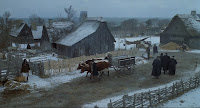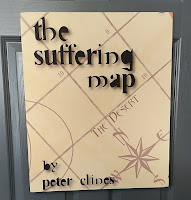I’ve mentioned experience once or thrice over the past few posts, and I figured it might not be a bad thing to blather on about. It’s one of those things we all talk about and acknowledge, but also all like to believe we’ve got enough and don’t need any more. Mostly because… well, how much is enough? How do you even measure experience? Are there real-world units of experience?
Anyway, let me toss out a few things we can all think about. Like this story you may remember. It’s funny and I’ve told it before.
As it says over on the About page, I’ve got really old New England roots. I mostly grew up in Maine, but I spent my high school years down in Plymouth, Massachusetts. Yes, with the Rock and the Mayflower and all that. One of the big tourist attractions there is Plimoth Plantation, a sort of ongoing LARP museum/interactive show of the original colony in the year 1627. Likewise, all the actors there are playing specific, actual historical figures from that year. You can walk in, talk to the different “residents,” and they’ll answer questions about what they’re doing at the moment or “current events.” Sometimes, depending, they’ll also ask about your odd and extremely improper clothing (young lady, are you showing your shoulders?!? In public?!?)
(weird fun fact—if you’ve ever seen that late ‘80s movie Warlock, the whole “Boston Colony” sequence they show at the beginning with the little town is actually Plimoth Plantation)
Anyway… a friend of mine from high school worked at the Plantation. They assigned her an age-appropriate historical role, and part of that role was getting married at the end of the summer to another character, Experience Mitchell (ahhh, Puritan names). The thing was, my friend kinda had a behind-the-scenes thing for another Pilgrim. So on the big day, she told me one of her co-workers gave her a “wedding gift” in the changing room, a t-shirt that said…
Experience is what you get when you don’t get what you want.
It was a clever pun, yeah, but the phrase stuck with me because… well, it’s true. If you talk to anyone who’s considered experienced, it’s because they failed or screwed up. Probably a lot.
Now—somewhat back on track—in one of the Sandman books, I remember someone (I think it was Eve?) told Matthew the Raven that everyone has at least three great stories in them. This is true, but I think there’s also an unspoken corollary there which is just as important. And it gets ignored a lot.
Yes, we all have at least three great stories in us, but we also have all have lots and lots of bad stories in us. Dozens of them. Maybe even hundreds. We have awful characters, contrived plots, cringe-worthy dialogue, and some incomprehensible structure. We’re not even going to talk about those horrible twists or the very awkward sex scene.
Yes, I’m saying we. I’ve written sooooooo much bad stuff none of you are ever going to see. My third grade attempt at a novel, Lizard Men From the Center of the Earth. My middle-school sci-fi novel. My Boba Fett and Doctor Who fan-fiction. My junior high fantasy novel. My high school werewolf-detective novel. My college novel, The Trinity. My after-college-moved-to-California novel, The Suffering Map. And mixed in there are a ton of comic scripts, short stories, screenplays, and I think even one solid attempts at a stage play. Thousands of pages. Thousands of hours of work.
And pretty much across the board, all that work sucks.
It sucks on different levels, for different reasons, but don’t doubt that most of it sucks hard. I spent weeks and months and years in one case writing stuff that should never again see the light of day. I’ve got no problem admitting it. In fact, being able to admit it let me move from being a random dabbler to a serious writer. I spent about twenty years digging through all those bad stories and found the good ones underneath. Maybe even one or two great ones.
Writing all those stories was my experience. I had to get them out. Whenever you hear about an overnight success or an amazing “first” novel, odds are that writer’s got a really long string of awful work behind them. Sure, there’s always a chance they really are an overnight success—sometimes those great stories are right on the surface, the way a prospector might kick over a rock and find a gold nugget just sitting there. But for the most part, becoming a good writer means a lot of, well, not getting what you want. Doing the work and then doing… more work.
Y’see, Timmy, there’s an all-too-common belief that just finishing something means it’s good. I mean, I made it all the way through to the end on my first try. That’s a lot of writing. That novel must be worth publishing and being read, right?
But the truth is, the vast majority of first novels are awful. And that’s okay. The second ones are pretty bad, too. Ex-Heroes was my first published novel, yeah , but it was my seventh-and-a-half attempt at writing one. And, as I hinted above, I’m really glad it was the first one people saw.
Because that junior high fantasy novel… jeeeeez, less said about that one the better. So embarrassing. On so many levels.
Sometimes we pour our hearts into something, spend weeks or months or even years on it, and we still don’t get us what we want. But at least we get some experience. If we admit we need it.
Next time, I think I want to talk about what was happening a few days before this.
Until then… go write.










